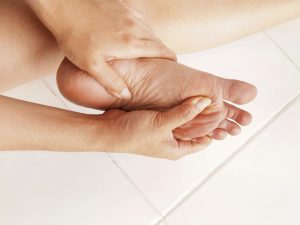Proper footwear is an important part of an overall treatment program for people with diabetes, even for those in the earliest stages of the disease. If there is any evidence of neuropathy, or lack of sensation, wearing the right footwear is crucial. By working with a physician and a footwear professional, such as a certified pedorthist, many patients can prevent serious diabetic foot complications
Why Diabetic Foot Care is Important
Diabetics need to be extra vigilant with their foot care. Diabetics often have reduced blood flow accompanied by Diabetes Peripheral Neuropathy which is nerve damage. Because of the nerve damage, diabetics cannot feel sensations of pain in their feet. Therefore, even small cuts, blisters and open wounds (foot ulcers) can go unnoticed and quickly become infected. Foot ulcers are the result of the top layer skin breaking down to expose the tissue underneath. Without the skin’s protection the tissue breaks down and can become infected. In addition, the poor blood flow increases the healing time for the cut or sore. In some cases poor foot care can lead to the amputation of a foot or leg.
In order to avoid serious implications and issues with their feet, Diabetics need to have a detailed foot care routine to catch cuts and sores before they become infected.Feet should be inspected every day for blisters, cuts, sores, bruises, redness, swelling and warm areas. If you do find any signs of injury, see a medical professional and do not try to treat it yourself. Also, never walk barefoot,in thongs or open sandals. This opens up the door to potential injuries.
Diabetic Footcare
Diabetics also need to wear special shoes that not only protect their feet but also accommodate any deformities. Diabetics are susceptible to issues such as foot ulcers, and Charcot foot which can deform the foot. Special diabetic shoes treat these issues while the foot heals. Even if you do not have any foot issues, you still need to wear protective shoes to prevent any problems. Shoes need to fit properly, relieve any pressure points, reduce shock to the bottom of the foot and limit the motion of joints. Shoe fittings should be done with a registered Pedorthist to ensure the best fit. It is difficult for people to judge the correct style and size and those with sensation loss will have an even more challenging time. \
Orthotics for Diabetics
Diabetics may also require a custom made orthotic that will relieve pressure in certain areas and absorb shock. Total contact orthoses provide comfort, protection and pressure relief for the entire foot. Diabetic orthotics help to avoid pressure sores from developing as a result of friction inside the shoe.
If you have any questions regarding diabetic foot care, need to be fitted for diabetic shoes or require custom orthotics, please contact Dr Mann for an appointment.

